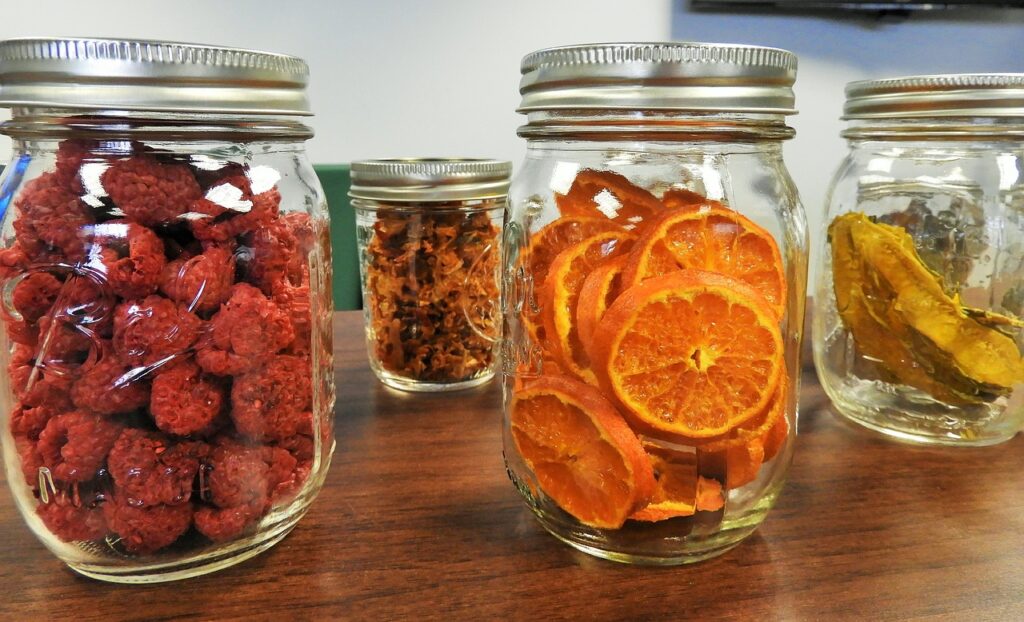Looking for an easy and efficient way to stock up on food for your next camping trip, an emergency preparedness kit, or simply to add more convenience to your pantry? Look no further than freeze-dried food! This innovative and versatile food preservation method has been gaining popularity in recent years and for good reason. In this article, we’ll explore the benefits of freeze-dried food and why it might just be the perfect addition to your lifestyle. Short answer: the benefits of freeze-dried food are numerous, and you won’t want to miss out on the convenience and nutrition it can provide.
What are the benefits of freeze-dried food for campers, hikers & backpackers, and even survivalists? Before we discuss all the benefits of freeze-dried food we first need to distinguish exactly what the term freeze-dried food means.
Many people use the terms dehydrated and freeze-dried interchangeably, but there are differences between the two methods of food storage that you need to be aware of and take into consideration when choosing meals for the campsite, the trail, or long-term food storage. The differences can be dramatic, as you will see.
Let’s examine these two food storage methods, and then look at a comparison between dehydrated and freeze-dried foods. That way you will be better informed when making decisions about the food you will be taking on your next camping trip or hike, and you’ll know which type of food is better for long-term emergency storage.
Dehydration

Dehydration is one of the oldest methods of food preservation. Dehydration is removing moisture from foods by the use of heat. In ancient times people would sun-dry various foods to help preserve them for the future, or they would put them in a hut with a fire to dehydrate and smoke the food. Bacteria and molds that cause food spoilage need moisture to survive and multiply. By removing moisture from foods, you can prevent these bacteria from spoiling your food for a limited amount of time. This can be helpful to fill short-term food needs.
Some dehydrated foods can be stored for up to a year in an airtight container. However, once opened, dehydrated foods can degrade relatively quickly because they can absorb moisture from the air. So, once exposed to the air, dehydrated foods must be consumed within a relatively short period of time. Sometimes as soon as within a week.
Dehydrating also breaks down or destroys some of the nutrition that is within the foods. This is especially true of water-soluble vitamins such as Vitamin C and Vitamin A. Dehydration can also break down the B Vitamins and some minerals. If you dehydrate foods you need to be sure and get enough of these vitamins and minerals from other sources to prevent deficiencies.
Freeze Drying
Freeze-drying is a storage process developed during World War II to preserve food, blood, and other items for long-distance shipment. Transportation times were much longer in the early 20th century, and a method of long-term storage was needed to support transportation to faraway lands without the need for refrigeration.
Freeze-drying uses a process to remove up to 98-99% of moisture from foods. In comparison, dehydration only removes 90-95% of moisture in the best circumstances. The total can be as low as 75% with some cheaper dehydration units. This gives freeze-dried foods a much longer shelf life. The shelf life for some freeze-dried foods can be up to 30 years!
How does freeze-drying work? The food items are flash-frozen in the first step. Once frozen, they are then transferred to a vacuum chamber, where the food is slowly warmed. This causes the water in the food to change from ice to a gas, without ever reverting back to a liquid. This process is known as sublimation. Sublimation is the same process that happens in comets as they approach the sun and warm. As the sun melts the ice contained in the comet the water changes to a gas because it is in the vacuum of space, without ever becoming a liquid.
The process requires expensive and complicated equipment. A freeze-dry unit for home use can run from $2500-$5000 or more. That is why most people purchase freeze-dried foods that are pre-packaged. On the other hand, food dehydrators are relatively inexpensive and can be used by most people at home. So you really need to compare the two before making a decision.
Benefits of Freeze-Dried Food For Camping

Many people like the convenience of freeze-dried food when they are camping. Freeze-dried foods are compact and lightweight. They retain more of the nutrients and structure of the original food. You can think of freeze-dried foods as being in a state of “suspended animation”. By adding water back to the food and giving it a period of time to rehydrate you are left with a food that is remarkably similar to the product before it was freeze-dried. In comparison, dehydrated foods usually end up dry and crunchy, or looking withered.
Freeze-dried foods take only minutes to prepare in camp. You can rehydrate with warm or cold water, but if you use cold water the time to rehydrate should be extended. Using hot water freeze-dried meals can be ready to eat in as little as ten minutes. Using cold water can take up to 20 minutes or longer. You simply open the package, remove the oxygen absorber, pour in the water, and reseal the package. Then you let it sit for the recommended time. When you open the package you can eat the food right from the pouch. This saves having to wash dishes since you only need a spoon or fork to enjoy your meal.
Benefits of Freeze-Dried Food For Hiking
One of the major benefits of freeze-dried food is the reduction in weight and volume of the food. Water weighs approximately 8 lbs. per gallon, so removing most of the water from food saves you from having to carry all that additional weight. This is a consideration when you are hiking or backpacking. Everyone wants to save as much weight as possible in their pack. This is even more crucial if you are backpacking on an extended hike. Every ounce reduced from your pack is the weight you don’t have to expend energy to carry.
Additionally, you only need to carry a small single-burner stove and a small metal cup or pan to heat water. This is another saving in both weight and space.
Freeze-dried food also retains more nutrients than dehydrated foods. Some vitamins, especially vitamins A and C, are lost during the process of heating and dehydration. Freeze-drying retains more of those water-soluble vitamins. Freeze-dried food retains up to 97% of the nutritional value of the original food. When food is dehydrated using heat it can lose up to 60% of its nutritional value. That means you retain a measly 40% of the nutritional value of the food when you dehydrate.
Long-Term Food Storage
Another of the many benefits of freeze-dried food is its long shelf life. With a shelf life of 20-30 years for some of these foods, you can put back a supply of delicious and easy-to-prepare food in case of an emergency. This can give you peace of mind knowing that if there is a disruption of the food supply during a natural or man-made disaster your family will be well-fed. Having a hot meal available and easily accessible can make any survival scenario much easier to cope with. They also provide valuable calories that can help you keep going during an emergency.
Some people use their long-term food storage supplies to supplement their daily meals. They simply rotate the stock as they use them, and reorder what they need. This assures that their survival pantry is always well stocked with the longest-lasting food.
Freeze-Dried Food Field Test
Conclusion
There are many benefits of freeze-dried foods. We have covered the main benefits, and I’m sure you can think of more. If you are looking for freeze-dried food for the outdoors or as an emergency supply, we have options in our online shop. From individual meals for camping, hiking, or backpacking, to large #10 cans that are suitable for long-term emergency survival, we have a large selection of options. If you purchase through one of our links, you will also be helping us continue to bring you articles like this. We receive a small commission when you purchase through the links in our shop, helping us continue to bring you the sights and sounds as we get Lost In The Ozarks.
FAQs:
Q: How healthy is freeze-dried food?
A: Freeze-dried food can be healthy because it retains most of its nutrients during the process.
Q: What are the disadvantages of freeze-dried food?
A: Freeze-dried food can be expensive and may contain added preservatives and sodium. Some people also find the taste and texture less enjoyable than fresh food.
Q: What are the benefits of freeze-drying food?
A: Freeze-drying food preserves its nutrients and flavor for longer periods of time than other preservation methods. It also reduces the weight of the food, making it easier to transport and store.
Q: What are the pros and cons of freeze-dried food?
A: The pros of freeze-dried food include its long shelf life, nutritional value, and convenience. The cons include the cost, added preservatives, and potential lack of flavor and texture.
Q: Is freeze-dried food good for you?
A: Freeze-dried food can be good for you as long as you choose options with low sodium and preservatives, and use it in moderation as part of a balanced diet.
Q: How long will freeze-dried food last?
A: Freeze-dried food can last for up to 25 years if stored properly in a cool, dry place.
Q: Can you eat freeze-dried food every day?
A: While freeze-dried food can be a convenient option for everyday meals, it’s important to incorporate a variety of fresh foods into your diet as well.
Q: Which is healthier freeze-dried or dehydrated?
A: Freeze-dried and dehydrated foods both have their benefits and drawbacks. Freeze-dried foods retain more nutrients and have a longer shelf life, while dehydrated foods are generally less expensive.
Q: Should you refrigerate freeze-dried food?
A: Freeze-dried food does not need to be refrigerated as long as it is stored in a cool, dry place.
Q: Can you freeze dry without a machine?
A: It is possible to freeze-dry food without a machine, but it requires a special set-up and can be time-consuming.
Q: Can you freeze dry bread?
A: Yes, bread can be freeze-dried and will last longer than fresh bread.